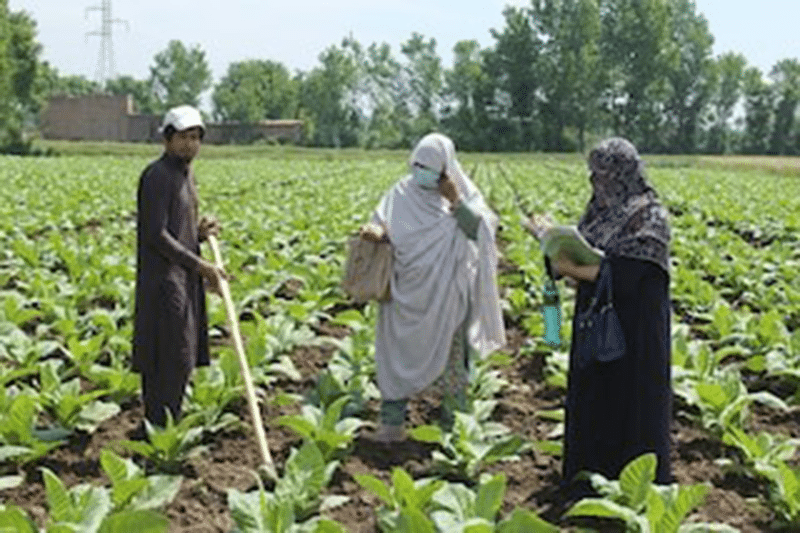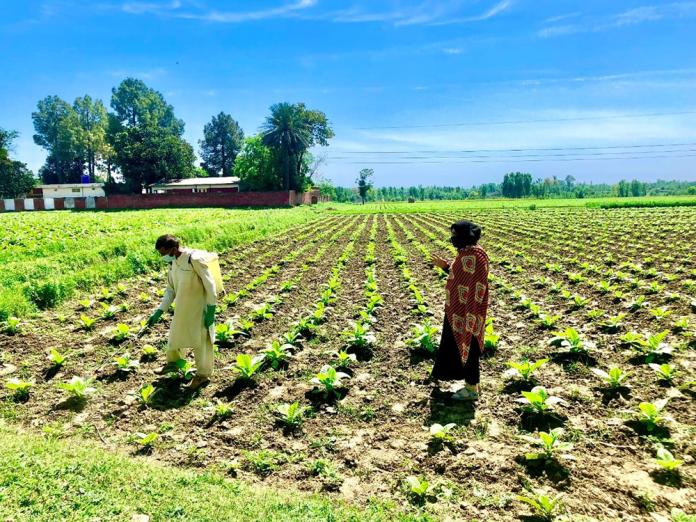Discover how a team of female “social mobilizers” are helping rural farming communities in Pakistan thrive by educating and empowering the women of the household.
There’s many an adage about “a woman’s place being in the home,” but Philip Morris Pakistan Limited (PMPKL)—Leaf Sustainable Agriculture, is reclaiming this outdated statement and turning it on its head.
The Pakistan side of the “Pashtun belt” in the northwest of the country is a major production center for flue-cured Virginia tobacco. The Pashtuns who live there are known for their rich cultural heritage and hospitality, but women face significant social barriers due to ingrained societal practices. Cultural taboos and stereotypes have led to multiple generations becoming isolated from society and confined to their homes. Despite this, female members of farming families play an integral role and are a driving force behind the success of many farms. PMPKL recognized the influence and knowledge that these women had, creating an environment where they could exchange farming information and learn new skills.

Women creating change
In 2021, as part of the “Access to Families” initiative, PMPKL contracted a team of “social mobilizers” who travel around smaller farm holdings in their network to ensure that they’re set up for success. Rather than analyzing crop quality or irrigation, these all-female teams liaise with the farmers’ wives, who run operations on the domestic sides of the farm.
The main goal of these mobilizers is to create awareness of PMI’s Agricultural Labor Practices (ALP) Code, which aims to improve labor practices in its supply chain whilst gaining a better understanding of the activities that take place on the farm. The mobilizers run sessions on ALP and help the families to understand the Code, its principles and measurable standards.
Before this project existed, male field technicians would visit the contracted farms1, giving advice to the male farmers on best practices for production and maximizing profits. Whilst these visits served an important functional purpose, cultural restrictions meant the male technicians were not permitted inside the home, nor could they interact with the female members of the farmer’s family who were involved in various activities, including curing, grading, and baling tobacco. This made it difficult for PMPKL to attain a comprehensive picture of what was happening on these farms.

This is where the female mobilizers came in. As they are allowed across the thresholds of these homes, they can work directly with the female spouses and families to both educate and report back on working and living conditions. They do the same for any female workers on the farm, ensuring that they are being treated fairly and correctly. The women also monitor availability of improved drinking water, sanitation (toilets), and handwashing facilities. These visits also allow the mobilizers to monitor the risk of child labor on farms.
They make a record of these practices and check over time to see if they’re being maintained, improved, or require attention.

Ammara, one of the social mobilizers, involved in the project, stated thatthere were 13 people involved in the project and as a women, we were able to speak to the farmers’ families, making them aware of the ALP Code and monitor them throughout the various crop production stages. She further stated that they also discussed the importance of the Code, how to create a safe work environment, and the women’s role in supporting the farmers.
Ammara also said that many farmers in their area had barns inside their house and women worked during the peak crop activities or cooked for their farmers and their workers. They also checked on any ALP violations or unfair treatments of women workers by PMI contracted farmers. If there were any issues, they were reported back to the PMI and an action plan was put in place to resolve the issues.
Syed Muhammad Suleman Gul, PMI’s Manager for Social Sustainability in Pakistan added that women in general were not allowed to go out to work in the public, in this region of Pakistan, and if they were to do, then they had to be veiled.
He further added that the steps taken by the PMPKL with the social mobilizer team was revolutionary by enabling these women to work out in the world and making a difference. This project played a key role in farm-by-farm monitoring, raising awareness of the farmers families and collecting information related to them, providing access to water, sanitation and hygiene and female worker wages.

Creating a future that is female
The team hopes to expand this project to 15 social mobilizers by the end of 2025. So far, data on over 3,000 farmers (100 percent of the farmers in the network) has been collected, and information on ALP and WASH practices have been shared. PMI’s goal is that 100 percent of its farmers will be aware of—and compliant with—the ALP Code.
Gul says this project has shone a spotlight on the crucial role that women play in farming, one that so often goes unacknowledged: He also added that women have an equal responsibility on the farms that we visited and they play a key role in tobacco production which needs to be acknowledged.


